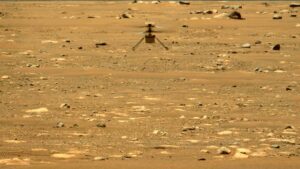That data confirmed that the 1.8-kilogram helicopter performed as expected on that flight.
“So far, the engineering telemetry we have received and analyzed tell us that the flight met expectations and our prior computer modeling has been accurate,” Bob Balaram, chief engineer for Ingenuity, said in a NASA statement.
This flight took place three days after Ingenuity’s successful first flight, when the helicopter rose to an altitude of three meters, hovered and then descended. On this flight, Ingenuity went to an altitude of five meters, then tilted slightly to allow it to move sideways two meters. It stopped and turned, then went back two meters and descended to a safe landing.
“It sounds simple, but there are many unknowns regarding how to fly a helicopter on Mars,” Håvard Grip, chief pilot for Ingenuity at JPL, said in the NASA statement. “That’s why we’re here: to make these unknowns known.”
The flight is the second in a series of up to five that the project plans to perform. At the April 19 briefing after the first flight, MiMi Aung, Ingenuity project manager, said the third flight would be similar to the second, but would have the helicopter move 50 meters sideways and back, rather than the two meters of this flight.
Project officials said at that briefing the plans for the fourth and fifth flights were still to be determined. “In general terms, what we’re talking about is going higher, going further, going faster; stretching the capabilities of the helicopter in those ways,” Grip said. Because Ingenuity is a technology demonstration, the project is willing to take risks that could result in the loss of the helicopter.
NASA said in the statement that, because Ingenuity flew as expected on its first two flights, “the Ingenuity team is considering how best to expand the profiles of its next flights to acquire additional aeronautical data from the first successful flight tests on another world.”
NASA did not disclose when the next flight is scheduled, but project officials previously said they expected to attempt flights every three to four days. They are also constrained by the schedule the overall Mars 2020 mission set for Ingenuity, reserving one month for the Ingenuity test campaign. This flight took place on the 18th sol, or Martian day, of that 30-sol test period.



